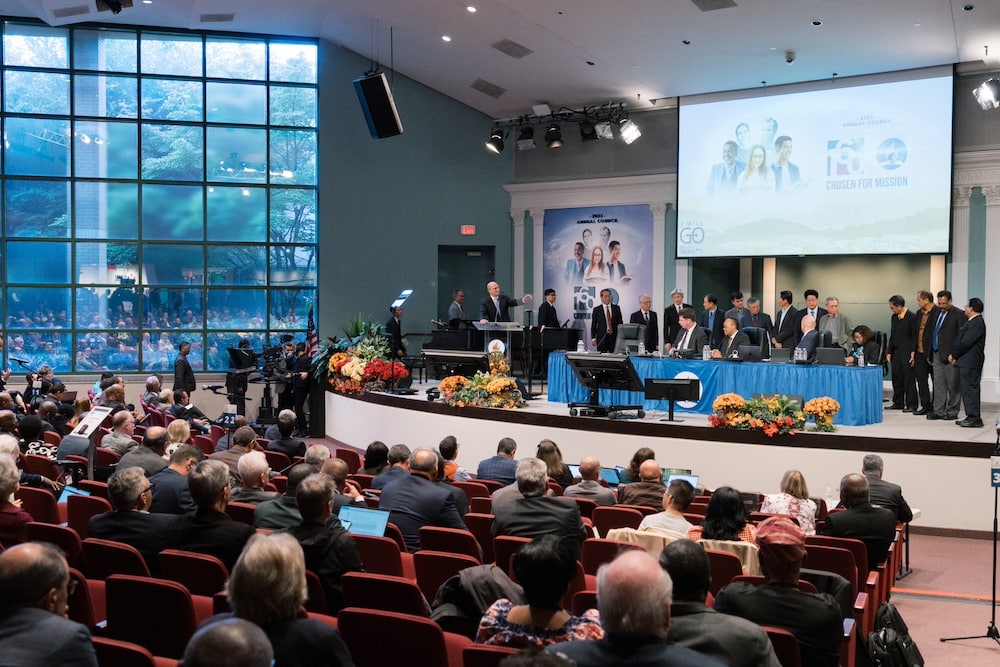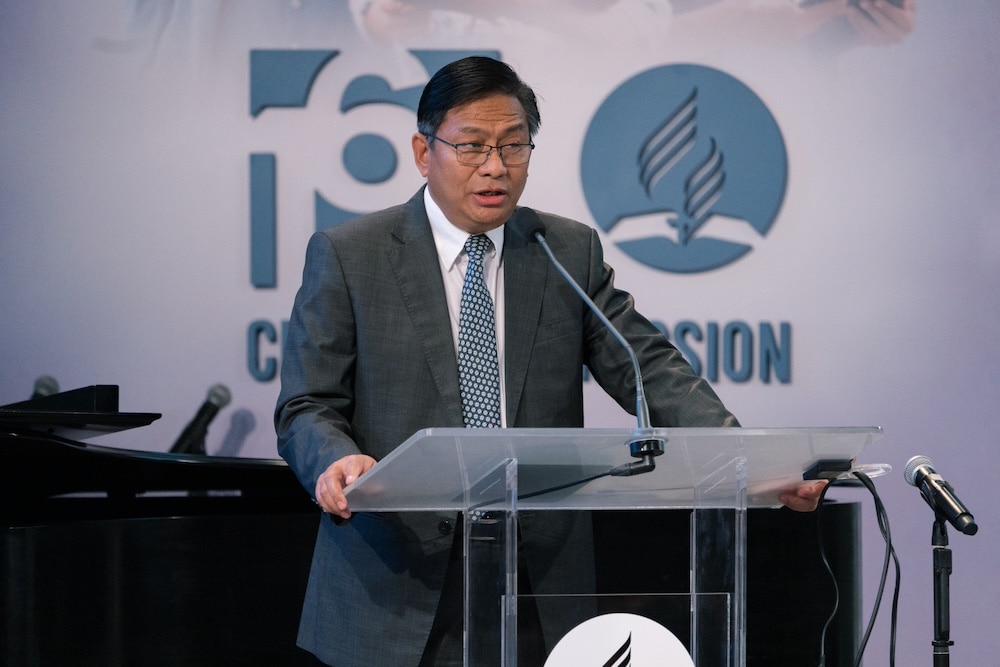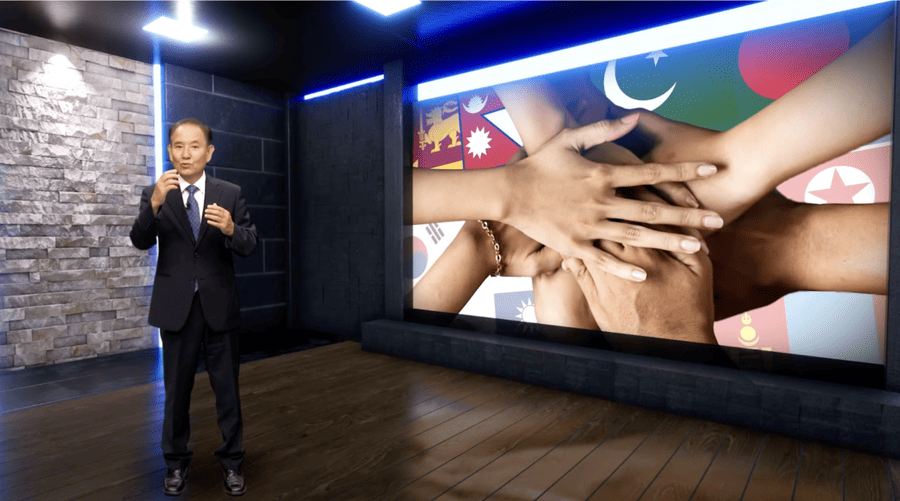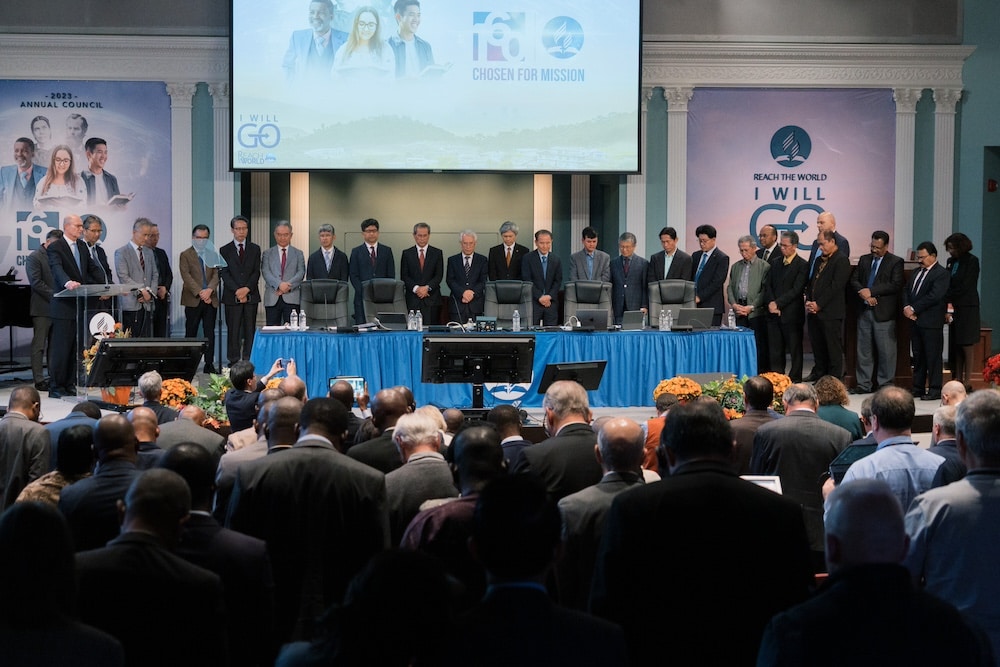
The Northern Asia-Pacific Division (NSD) of the Seventh-day Adventist Church will expand to receive four new territories, effective immediately, after General Conference (GC) Executive Committee (EXCOM) members voted to support the change on October 8 during Annual Council meetings.
This expansion places three territories that were previously within the Southern Asia-Pacific Division (SSD) — Bangladesh, Sri Lanka, and Pakistan — within the NSD. This vote also places within the NSD the country of Nepal, previously a part of the Southern Asia Division (SUD). This territorial adjustment aligns with the NSD’s Mission Refocus initiative, church leaders said, and will allow the division to have more impact on the 10/40 Window, a region of the world with a majority of the world’s population but where Christians are a minority.
Background to Territorial Realignment
GC associate secretary Saw Samuel presented to EXCOM the background on the proposed territorial realignment. Saw read the Asia-Pacific Territory Review Survey Commission Proposal, presented by the NSD EXCOM to the GC on June 30. In it, the NSD committee requested that an official recommendation be made to the GC Administrative Committee (GC ADCOM) and EXCOM at the 2023 Annual Council.
The document, made available to delegates via their general agenda, outlined how the 2019 decision to attach the Chinese Union Mission (CHUM) directly to the GC left the NSD with four regions — Korea, Japan, Mongolia, and Taiwan — and a lack of access to the 10/40 Window.
The four additional countries were chosen, although physically separate from the rest of NSD, due to the division’s desire to focus on mission. “The division asked if they could somehow receive additional territory that would provide them with 10/40 Window opportunities,” GC president Ted N. C. Wilson said. Addressing EXCOM members, he added, “We are hoping to create an enlarged perspective within NSD for many countries and cultures, and to encourage a multicultural approach to mission.”
Explaining the administrative technicalities related to this shift, GC undersecretary Hensley Mooroven carefully outlined how delegates would be distributed across the NSD, the SSD, and the SUD. Delegates currently serving, regardless of which division they have been realigned with, would continue to remain as EXCOM members for the remainder of this quinquennium. This would allow those who have invested time in their offices and roles to remain EXCOM members and GC Session delegates through 2025.
“This is a short-term accommodation so that you who represent us will stay for the next Annual Council,” Wilson said, supporting Mooroven’s presentation. “Our quinquennium is three instead of five years. Everything will reset at the new quinquennium according to the policy.”
Four Areas of Emphasis and Delegate Responses
After GC EXCOM heard the proposed territorial adjustment, NSD president Yo Han Kim shared a video report outlining four areas of focus for ministry across the NSD’s expanded territories. After the presentation, EXCOM members shared their thoughts on the presentation and the proposed agenda item.
Health ministry will be a major focus for NSD, with all hospitals and clinics invited to join the division’s health care association to improve institution management.
Multiple delegates, including Adventist Health Ministries director Peter Landless, Pakistan Union president Myun Ju Lee, and SSD president Roger Caderma, highlighted the importance of this health focus and the challenges faced by Karachi Adventist Hospital in Pakistan and Lakeside Adventist Hospital in Sri Lanka. Both hospitals will now be managed by the NSD.



“I’d like to express an appreciation to the divisions that have cared for those so far, and an appreciation that if this is voted to the NSD, as to the commitment they are making to these hospitals that are key to our evangelism and outreach in these areas,” Landless said.
“We need to pray earnestly for this institution,” Wilson added, speaking of the Karachi hospital. “It’s in a very precarious situation, and if we don’t take care of it, we will lose much. The NSD has committed to doing just that, and Landless is traveling to the hospital in two weeks to do an assessment. So, we will have a very comprehensive plan to make sure Karachi hospital is not only stabilized but that it grows.”
Another major focus of discussion was the NSD’s plan to establish an Urban Center of Influence in Bangladesh. “The plan is to start this project in Bangladesh while praying that we can extend this to the other three countries,” Kim said. This US$4 million project will create a 10-story building with a total area of 10,000 square meters (almost 108,000 square feet) that will serve as a business hub and include an Adventist primary school, Adventist dental college, international school, hospital, pharmacy, office, and a wedding hall.
NSD further plans to establish an academic curriculum for pastors lacking theology degrees and introduce an evaluation program for pastors hoping to follow the ordination process. A leadership certification program for elders, deacons, and deaconesses is also in production to foster the growth of lay leaders.
“Our primary objective is the nurture and empowerment of pastors through ministerial support and comprehensive training,” Kim said. “We believe we can achieve great things together in carrying out the Lord’s work in these new countries.”
Kim’s presentation also included plans to form small groups, prayer gatherings, mission projects, and outreach focused on Muslim women. Plans to broaden the missional focus of Adventist educational institutions within NSD include increasing daily Bible studies, and spiritually focused community events.
“We have an ambitious plan to establish international Adventist schools that offer high-quality education rooted in Adventist principles,” Kim added. “Additionally, we will implement English language teaching programs to facilitate the integration of foreign students.”
A focus on digital outreach methods, integrating Hope Channel, Adventist World Radio, and other collaboration opportunities found at the GAiN conference earlier this year was also mentioned in the presentation.
Kim concluded his presentation with a message of encouragement on behalf of NSD: “We extend a heartfelt welcome to our brothers and sisters from Bangladesh, Pakistan, Sri Lanka, and Nepal. It’s our privilege to embrace you into our fold, and we look forward to working alongside you.”
Special Thanks and Leadership Recognition
Following the vote, Wilson invited the leaders of each division, union, and mission within those territories on stage to express appreciation for their leadership and to be prayed over as they navigate their newly realigned territories.
“We want to show you a united approach to the beginning of the reconstituted NSD,” Wilson said. “We need to pray for this special new team. God will bless them amazingly.”
The original version of this story was posted on ANN.